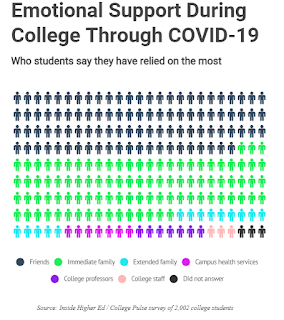Abstract & Works Cited
Abstract The most prevalent and universal issue that most people are facing is the COVID pandemic. Many people are having to face supplemental challenges that would not have been so affecting before. The pandemic has changed the lives of many people, including the lives of college students and faculty. The issue for most students and faculty is the transition from in-person learning to remote learning. This paper will explore the issue of how the shift has aggravated the mental health of college students. Moreover, this paper will help better understand how the transition to remote learning impacted certain sectors of the student population. Furthermore, social isolation due to the pandemic has forced first generation college students in particular to face the issue of “belonging” at college. This paper will discuss how “belonging” creates an environment of perceived isolation for this sector. The privatization of public higher education further intensifies this issue because it i...

